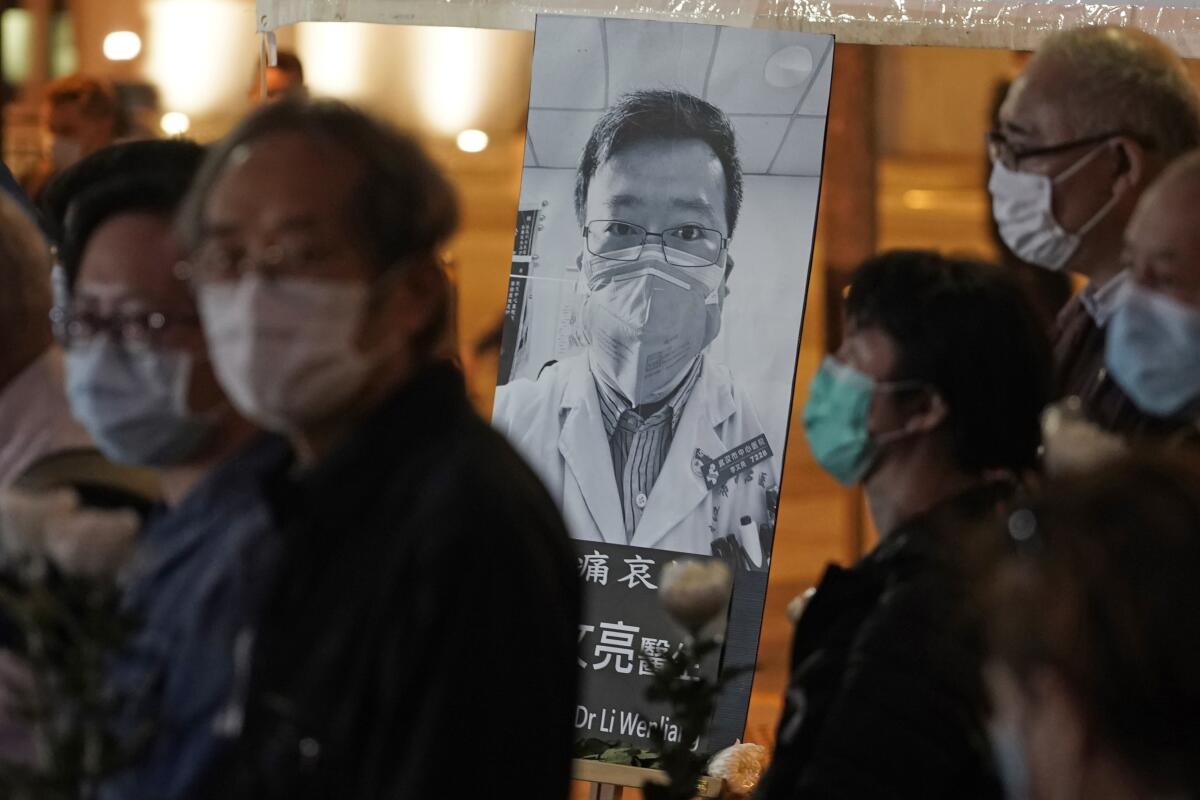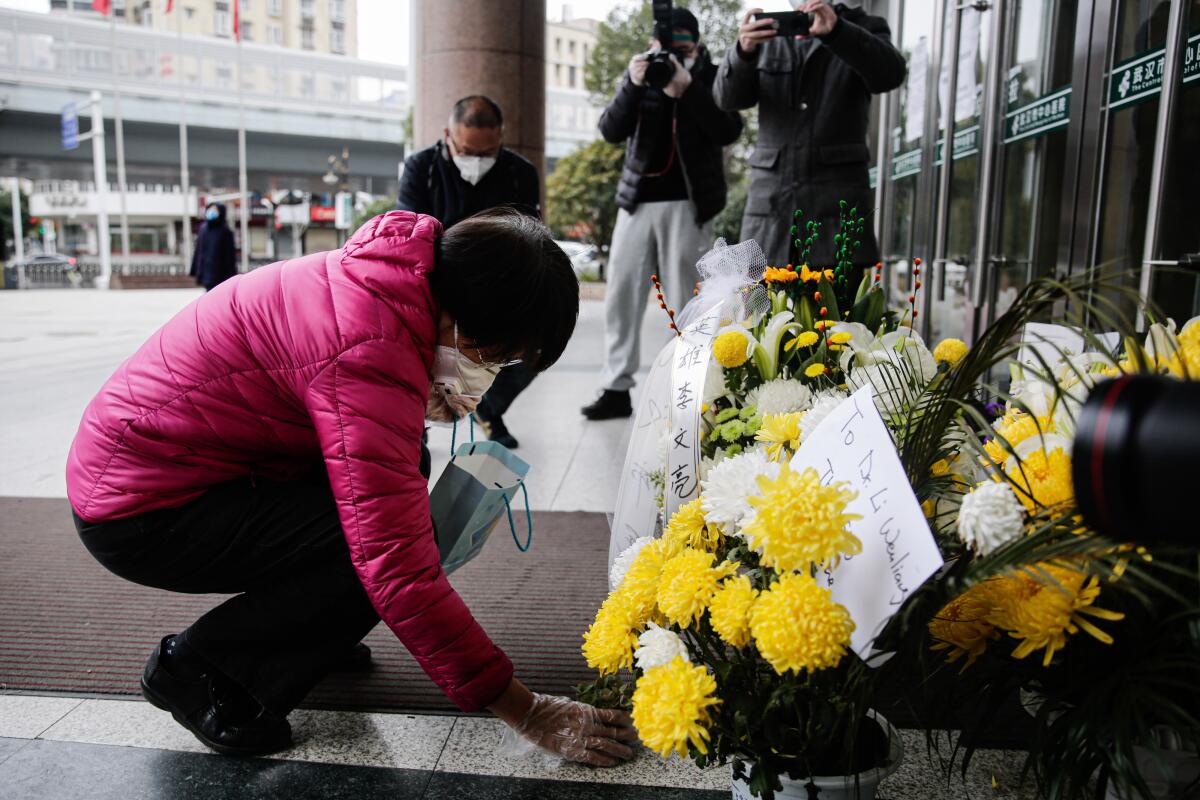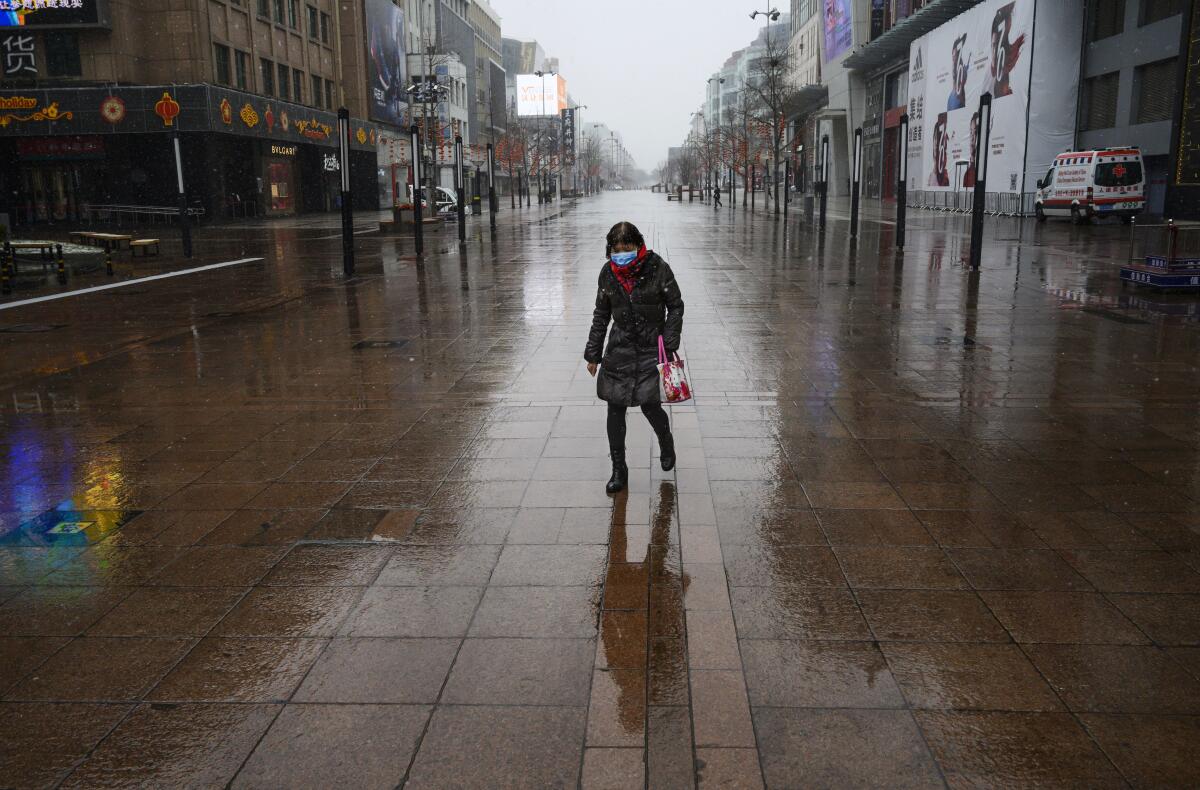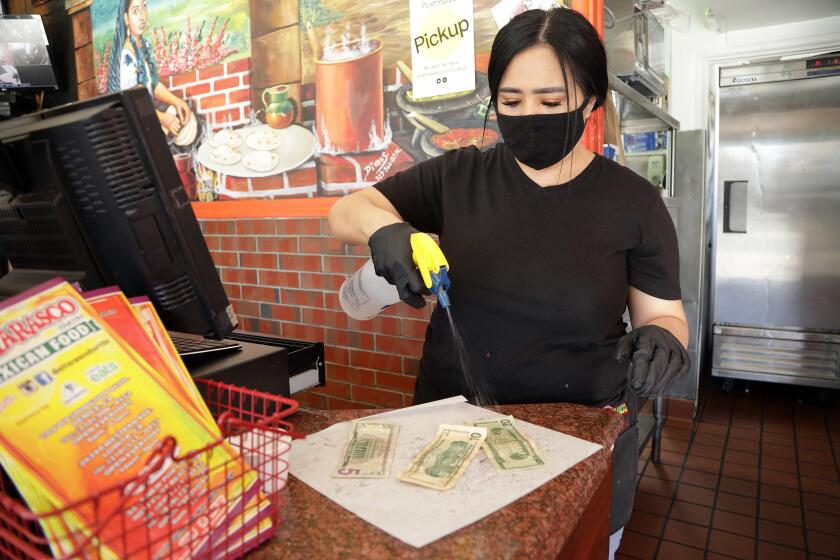Coronavirus killed China’s whistleblower doctor. Now the virus has changed how the country can mourn him

- Share via
SHANGHAI — They speak to him like they know him, calling him brother, uncle, doctor, hero, comrade, martyr, friend.
“Doctor Li, I had a dream that I saw my grandfather just now,” one person writes on Dr. Li Wenliang’s Weibo wall at 3:35 a.m. “It was like when I was little, coming home from school to find him in the farm, offering me pocket money. ... If you meet my grandfather over there, please tell him: I miss him.”
Almost two months have passed since the death of the whistleblower doctor who was punished by police for sending warning messages in a chat group about the new coronavirus. Yet the comment section of his final blog post — one sentence on Feb. 1 announcing he’d tested positive — lives on.
It’s become a communal diary, a virtual wailing wall, one corner of the censored Chinese internet where thousands of visitors meet each day from their different worlds of isolation.
At 2:43 a.m., a medical worker writes: “I’m back from Hubei … tomorrow I’ll be out of quarantine, and the city hospital is having a welcome ceremony. But I feel no joy at all.”
At 3:33 a.m., another commenter writes: “Dr. Li, don’t you know, the pressures of life are so heavy. I’m feeling like I can’t breathe.”
As day breaks, thousands of commenters wish the deceased doctor “good morning,” telling him about the rain, the snow, the sun and the wind in Kunming, in Wuxi, in Changsha, and share pictures of white and pink blossoms opening against an azure sky.
It’s Qingming, the annual season when soft rain draws fresh life out of the earth, and Chinese families honor their ancestors. The official holiday falls on Saturday this year: Tomb-Sweeping Festival, a day for the dead that also celebrates life as generations gather at the graves of those they’ve loved.
This year, in the time of a deadly virus that sprung from this land and spread to the world, Saturday has been declared a national day of mourning. Flags will fly at half-staff across the country, public recreational activities will be closed, and at 10 a.m., three minutes of silent mourning will take place for those who have died of COVID-19 or died fighting the disease, while air raid sirens and car, train and ship horns will sound.
On Thursday, Li Wenliang and 13 other front-line workers who died in the fight against COVID-19 in Hubei province were declared official martyrs. The distinction for Li was a bit of revisionism by a government whose local authorities had reprimanded him for what they claimed was spreading rumors about the dangers of the virus.
“‘Martyr’ is the highest title of honor the party and state give to those who heroically give their lives for the nation, the society, and the people,” said a CCTV broadcaster on the state-run nightly news.
The deceased heroes had fought “under the strong leadership of the Central Party Committee with Comrade Xi Jinping at its core,” she said.

Some of the visitors to Li’s Weibo site said they wept when they heard his name on TV, moved that he was recognized as a hero and hopeful that this meant his family — he is survived by his parents and a wife who was pregnant with a second child when he died — will be well taken care of.
Others scoffed. “What martyr, what half-flag, what silent mourning, what public memorial? If there isn’t reflection and change, everything is just a show,” one user wrote on April 3.
One week before Qingming, rain fell upon silent rows of gray tombstones at a cemetery on the outskirts of Shanghai. Chinese characters were carved into them: “Nostalgia,” “Remembrance” and “Mother’s love, deep as an ocean.”
A dozen police in uniforms and yellow vests guarded the cemetery entrance, blocking anyone without a reservation from entering.
“It’s a special time. Epidemic,” one said, waving a taxi passenger away.
While China’s COVID-19 outbreak has come largely under control, with few cases of local transmission and many provinces trying to get back to work, authorities warned weeks in advance that Qingming gatherings could spur a second wave of infections.
Los Angeles Times’ visual coverage of the coronavirus crisis
Cemeteries have been ordered to restrict access nationwide, many of them shutting down altogether or requiring online reservations for limited groups only. City authorities have instead pushed “cloud tomb sweeping,” asking families to watch online videos of the graveyards and post virtual messages while staying socially distanced at home.
Some made early tomb-sweeping visits anyway. On Sunday, a family of six brothers and sisters, their spouses and children in tow, gathered at the Shanghai cemetery to honor their mother, who died Jan. 27, the third day of Chinese New Year. Her name was etched on the tombstone, next to their father’s.
They lighted incense sticks and laid out offerings of flowers, fruit and qingtuan, a green glutinous rice ball traditionally eaten during Qingming. Then they built a fire in a large bin, and began burning their mother’s clothes.
“This is an ancient Chinese tradition, a way of offering,” said Dou, the oldest of the siblings, who asked not to use his full name for privacy. He pulled his fedora down and blue surgical mask up, blinking back smoke from the fire.
This year, the family gathering was smaller. Everyone had been at home for most of the last 10 weeks, watching and waiting as the virus consumed Wuhan, shut down China, then ripped into the rest of the world. Of course Qingming felt different, Dou said.
“How does it feel this year? It’s the same nationwide,” he said. “The people are in silence.”
He knelt before his mother’s grave and kowtow-ed, pressing his forehead toward the earth.

In Wuhan, where China’s coronavirus outbreak began, all cemeteries are closed. Local crematoriums began to distribute the ashes of the dead last week. Thousands of urns were distributed to family members who stood in line for hours, spaced apart even as they waited to take their loved ones home.
Chinese government figures report that 2,563 people have died of COVID-19 in Wuhan, but many doubt that number because it excludes many people who died untested and uncounted early in the outbreak, when hospitals were overflowing and testing capacity far below what was needed.
More than a million people have now been infected worldwide, and about 59,000 have died.
Li’s wall sometimes reads like a tribute to the trivialities of everyday life, those moments taken for granted before the coronavirus. “Today I ate pork and leek dumplings. They were delicious,” one user wrote. Pictures of fried chicken, Li’s favorite food, abound.
Other posts speak the questions some may struggle to speak out loud.
“Dr. Li, after death, do you get a god’s perspective to see everything? Do you know what I’m thinking?” wrote a commenter on March 28. “Or is death like a candle going out? All that’s left is the memories of those who are still living?”
Many ask Li to greet those they have lost.
“Dr. Li, can you see my grandma there? I feel like I’m forgetting her face,” wrote another user on March 28.
Still others track how life goes on: a woman breaks up with the boyfriend she’d once planned to marry, and suddenly misses her parents. A salesperson rejoices to fill the first order she’s had in months. A high schooler promises Dr. Li he’s going to study medicine one day. A man returns to Hubei.
On Friday, one person tells Li it’s getting warm in Shanghai. Delivery people are entering apartment complexes now, and things seem to be getting back to normal.
Then he quotes from a recent speech by Chinese novelist Yan Lianke: “If we can’t be whistleblowers like Li Wenliang, then let us be the people who hear the whistle. If we can’t speak loudly, let us be whisperers. If we cannot whisper, let us be silent people who have memories.”
“Let us be the people with graves in our hearts,” he quotes, and promises Dr. Li to remember.
More to Read
Sign up for Essential California
The most important California stories and recommendations in your inbox every morning.
You may occasionally receive promotional content from the Los Angeles Times.












